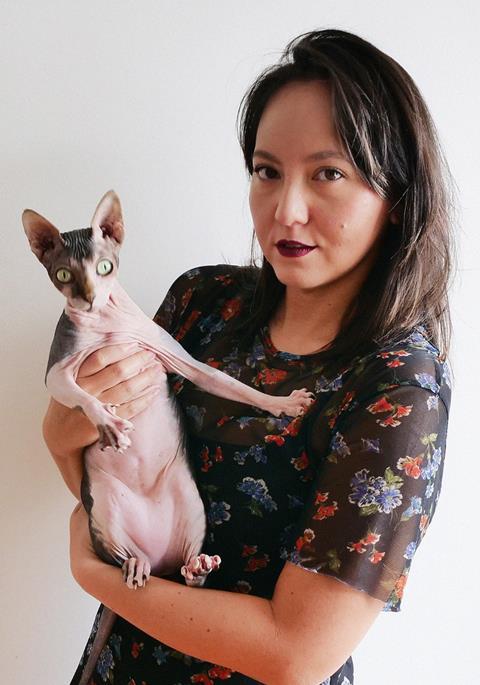
Malaysian director Amanda Nell Eu’s feature debut Tiger Stripes has achieved breakout success following its premiere at this year’s Cannes Film Festival.
The coming-of-age body horror won the grand prix for best film at the Critics’ Week sidebar, marking a first for the Southeast Asian region. It is now playing at South Korea’s Bucheon International Fantastic Film Festival (Bifan) in the Bucheon Choice: Features competition, having previously been a development project at the festival’s industry platform.
Eu represents the first Malaysian female director ever selected for Cannes while her three young actresses – Zafreen Zairizal, Deena Ezral and Piqa – arrived at the premiere in wild outfits with bold Malayan tiger stripes in reference to the Malay-language film’s concept.
Newcomer Zafreen plays the central character, a 12-year-old who gets bullied by her peers when showing her first signs of her puberty. Instead of running from her fears, she learns to embrace her physical transformation that would turn her into a tiger-like monster. Eu has explored the theme of female monsters in her previous award-winning short films, It’s Easier to Raise Cattle and Vinegar Baths.
Eu was born in Malaysia and moved to the UK, where her grandmother is from, aged 11. Going to school in High Wycombe, she went on to study graphic design at Central Saint Martins before enrolling in the London Film School.
Eu found the pandemic lockdown the most mentally challenging when developing Tiger Stripes. “It’s my first feature so there were a lot of fears and doubts about going into production, but nothing had prepared us for the long wait of lockdown, and eventually shooting during a Covid wave in Malaysia,” she says on the eve of Bifan. “Overcoming these challenges was tricky, but it made all my normal doubts in myself as a first feature director disappear.”
Raising the Tiger
Tiger Stripes was first developed in late 2017 before Eu set up Kuala Lumpur-based Ghost Grrrl Pictures with her Malaysian producer Foo Fei Ling to champion female-focused stories from Southeast Asia. Their first film project was eventually selected for 14 labs and markets such as Cannes’ Cinefondation’s Atelier, Locarno’s Open Doors, Talents Tokyo and Bifan’s Network of Asian Fantastic Films (NAFF), all of which were instrumental in finding international collaborators.
“In the very beginning, I only thought about working with a handful of European countries like the previous generation of Southeast Asian films,” says producer Foo. “Luckily for us, when we were ready for financing, out came a few new co-production grants from our region and because of that, we could make the film with more resources, which we had never been able to before this.”
The new co-production grants included the international co-funding programme from Taiwan Creative Content Agency (TAICCA), the Southeast Asian co-production grant from Singapore Film Commission and the creative industry recovery grant from Malaysia. These were among the 21 soft funding sources that Tiger Stripes successfully secured, which also included the CNC, Hubert Bals Fund and Doha Film Institute.

The project ended up as a rare eight-country co-production, with Films Boutique handling international sales. “The film was mostly made on soft money,” says Foo. “Yulia [Evina Bhara from Indonesia’s Kawankawan Media] first boarded the project without reading the script. Patrick [Mao Huang from Taiwan’s Flash Forward Entertainment] came in last to close the gap and sent us into production.”
Further international producers include Akanga Film Asia’s Fran Borgia from Singapore, Juliette Lepoutre and Pierre Menahem from France’s Still Moving, Weydemann Bros’ Jonas Weydemann from Germany and PRPL’s Ellen Havenith from the Netherlands.
“Cannes was the first time all the producers had gathered in one place after such a long journey,” recalls Foo. “This super band of producers is very generous in sharing their experiences and knowledge at every stage of the film.”
Foo started working in the industry with many Malaysian New Wave filmmakers and has previously acted and worked in different departments as well as producing two feature projects, 2012’s If It’s Not Now, Then When? by James Lee and 2016’s Voyage To Terengganu by Amir Muhammad and Badrul Hisham Ismail. Tiger Stripes marks her first major international co-production.
The film has benefited from working with an international team in various departments such as cinematography, editing, music, SFX makeup and post production. “There’s a lot of trust and respect for each other and the work, which is the most important,” says director Eu. “I felt very supported the entire way, especially creatively. Everyone knew the story we were trying to tell.”
Feline inspiration

The filmmaker also finds a constant source of inspiration in her two cats. One, a sphynx cat, was used as an example for her creative team and the whiskers of the other (when they fell off) were used by the make-up team for an extreme close-up of Zafreen’s character.
While Malaysia’s National Film Development Corporation (FINAS) provided an international promotional grant to cover certain expenses in Cannes, Indonesia’s Ministry of Education, Culture, Research and Technology sponsored a reception party for Tiger Stripes and Indonesian short film Basri & Salma In A Never-Ending Comedy. The latter, directed by Khozy Rizal and produced by John Badalu, is Indonesia’s first short film in Cannes’ official selection.
Only three Malaysian feature films were previously selected for Cannes. The last entry was 13 years ago when Woo Ming Jin’s Tiger Factory was selected for Directors’ Fortnight.






![The Brightest SunScreen[Courtesy HKIFF]](https://d1nslcd7m2225b.cloudfront.net/Pictures/274x183/3/5/0/1448350_thebrightestsunscreencourtesyhkiff_312678.jpg)


















No comments yet